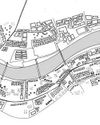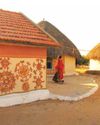An appreciation of the Baroque style of architecture and in churches constructed in Goa and Bangalore. The important characteristics of this style were the spatial invention, the concept of movement, drama and sculptural decoration and freedom of detail.

A brilliant new style of architecture – Baroque developed in Europe in the seventeenth century. It was also the century when geniuses like Newton, Galileo and Kepler were born and a new rational growth of science took place. Various discoveries were made during this time that the earth was no longer the center of the universe and it was Kepler’s discovery that the heavenly bodies moved not in circular paths but in elliptical orbits with many theories of science often being in conflict with religion.
Baroque style in architecture also developed from Renaissance buildings of Michelangelo, a radical sculptor and architect whose concept of architecture was something living and was stepping stone to the dynamism of Baroque churches.
The etymological origin of the word was perhaps from the Portuguese Barocco describing pearls of irregular shape. It refers to aspects of seventeenth century Italian art and served as an umbrella to gather a variety of international styles like Early High and Baroque classicism in countries all over world including France, Germany, Austria, England, and India. Although Baroque architecture was invented in Italy, it developed in India in the first decade of the seventeenth century and was bought by the Portuguese. It was also a time of great splendor with artists being asked to satisfy a taste for magnificence by creating works in which arts like painting sculpture architecture and urbanism were fused. The churches built during the Baroque period also represent oval shaped form, spatial invention and freedom of detail.
In Goa, the cultural influence of Portuguese who came to India in early sixteenth century as merchants and is reflected in the architecture of churches who introduced the Baroque style of construction.
Denne historien er fra July 2017-utgaven av Indian Architect & Builder.
Start din 7-dagers gratis prøveperiode på Magzter GOLD for å få tilgang til tusenvis av utvalgte premiumhistorier og 9000+ magasiner og aviser.
Allerede abonnent ? Logg på
Denne historien er fra July 2017-utgaven av Indian Architect & Builder.
Start din 7-dagers gratis prøveperiode på Magzter GOLD for å få tilgang til tusenvis av utvalgte premiumhistorier og 9000+ magasiner og aviser.
Allerede abonnent? Logg på

Interlacing Perspectives
‘Meraki-2019’ A visionary Seminar series presented by Dr.Baliram Hiray College of Architecture, Bandra(East), Mumbai.

Facilitating A Community Through Architectural Practice
The humble, self-designed, self-built and organically planned home built by the majority of the world population rarely gets appreciated and critiqued as a viable lesson in architectural design.

The Art Of Solving Problems Creatively
The practice of architecture is perhaps incomplete without the complement of a variety of other arts.

Upcycling towards a playful tomorrow
Play is like the middle child, often forgotten, and always taking a back seat. For young kids, play can simply be running around, armwrestling with friends, building sandcastles on the beach, or singing popular music tracks in the shower.

Balancing The Poetics And Pragmatism Of Everyday Design
Humanity is faced with an oxymoronic crisis. The crisis involves the earth, the environment, impending looms of climate change, deforestation, loss of species, dwindling resources etc.

Just Give Me Some Space: Discussions And Beyond
Just Give Me Some Space (JGMSS) is Suha Riyaz Khopatkar’s debut book that paints a portrait of the dynamic life of an architecture student.

The Next In Vernacular Architecture
Architecture has become a capitalist.

Rethinking The Future: Architecture And Its Education
“I want to be like animals, the bird makes a nest in one or two days, the rat digs a hole in a night, but intelligent humans like us spend 30 years to have a house, that’s wrong.” - Jon Jandai

Uniting The Human-Scale With The City-Scale
London-based architect Usman Haque is famed for his interactive architectural systems, and for his exploration of newer, more effective ways of creating human engagement and interaction through his designs. Indian Architect & Builder caught up with him, to quiz him on a variety of topics such as his journey as an architect, his inspirations and philosophies, architects using the digital revolution to their advantage, and more!

Framing spaces
Almost every architect also doubles as a photographer or at least an enthusiast.